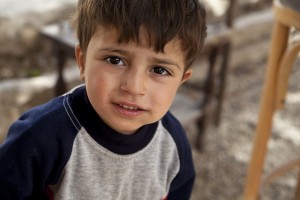Last night at the Anglican Diocese of Sydney’s annual Synod meeting (church parliament), a motion was introduced that the Anglican Diocese of Sydney “call on the government to remove children from all forms of detention under Australian jurisdiction, and for the church to commit to pray for the Prime Minister and for the Minister for Immigration in their work”. The motion was brought by Michael Jensen, Anglican Minister and son of the previous Archbishop of Sydney, Peter Jensen. He wrote this document as the background to his motion.
We live at the prosperous and secure end of a fractured and divided world, a world in which there are families that sometimes have to flee for their lives.

A Syrian refugee child
Christians are not surprised that this is so. The Bible tells us that humankind is in rebellion against God, and so divided amongst itself. And it tells enough stories of exile, alienation and brutality that we learn exactly what the consequences of that rebellion are. One of the worst of these is the innocent suffer along with the guilty.
Even were it the case that the asylum seekers held in detention on Christmas Island and Nauru are there as the result of their own illegal activity, their children are not. And yet, as of September, there remain 603 children behind the wire of Australia’s secure immigration detention facilities.
This situation cannot be just.
My intention is not to debate Australia’s refugee policy this evening. I am not naïve: I recognise that governments are often choosing the lesser of two evils.
Rather: I am asking synod to recognise that the policy of keeping the children of asylum seekers under lock and key, often for extended periods, is an unacceptable way to treat our neighbours.
It is not loving.
Detention centes are, according to Professor Pat McGorry, “factories for producing mental illness”. An Australian study of children in detention has found that the incidence of Post-Traumatic Stress amongst such children is 100%.
Two important Bible questions haunt me. They are ‘Am I my brother’s keeper?’ and ‘And who is my neighbour?’
Both of these questions are asked by people seeking to evade responsibility:
Cain, the murderer of his brother, simply shrugged his shoulders when God asked him where Abel was.
A lawyer quizzing Jesus about his own salvation wanted to justify himself by narrowing the category of ‘neighbour’ to include just those who lived in his small suburban cul-de-sac.
It is this narrowing sphere of concern that most concerns me about my own heart, and about the hearts of my fellow Australians. Are the children in detention my responsibility?
They, like me, was made in the image of God. They, like me, are called to live life on the earth to the glory of God. They, like me, are made of the same flesh that Christ himself took on.
But more that that: these children have come from troubled lands seeking my protection and help. They have been placed in my care. Am I my brother’s keeper? Surely the answer to that ancient question is: yes, I am.
The children in detention do not live in my street. And yet: they are my neighbours. I am – we are – responsible for them.
It is the example of Jesus Christ that teaches us here: – he, who himself, by his own life and costly death, takes responsibility, out of the storehouses of his grace and mercy, even for those who were his enemies –
we are our brother’s keeper;
we are his neighbour.
And that means that we cannot simply remain unmoved at this moment.
Synod: I urge you to send this respectful but firm message to our political leaders, with our promise of prayers for them in their work.
Image by Maximilian V via Flickr
Email This Story
Why not send this to a friend?
